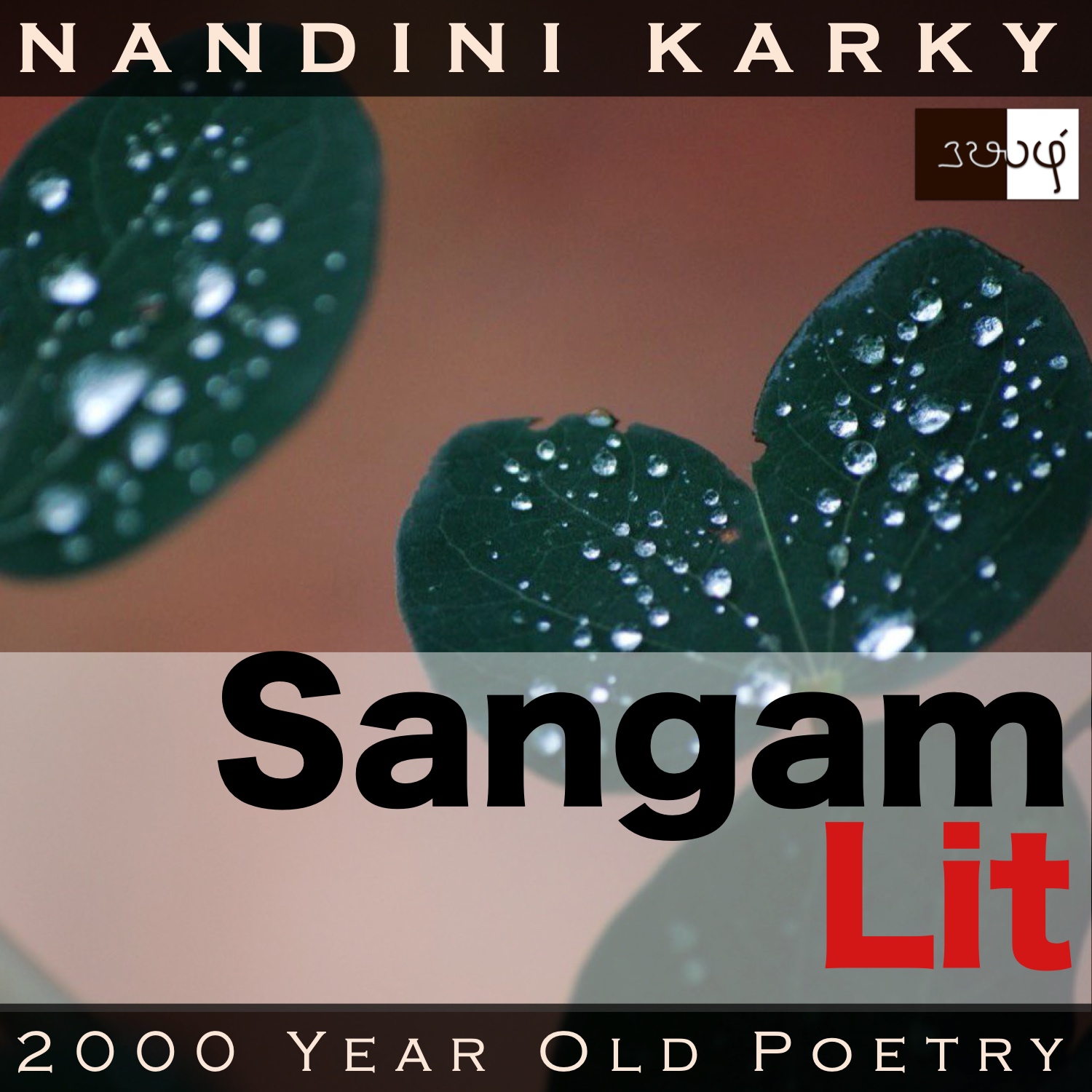Podcast: Play in new window | Download
Subscribe: Apple Podcasts | Spotify | Amazon Music | Android | iHeartRadio | TuneIn | RSS | More

In this episode, we relish words of consolation, as depicted in Sangam Literary work, Natrinai 274, penned by Kaavanmullai Poothanaar. Set in the drylands of ‘Paalai’, the verse speaks in the voice of the confidante to the lady, offering words of comfort to allay the lady’s worry about the man’s travels through the drylands.
நெடு வான் மின்னி, குறுந் துளி தலைஇ,
படு மழை பொழிந்த பகுவாய்க் குன்றத்து,
உழைமான் அம்பிணை தீண்டலின், இழை மகள்
பொன் செய் காசின், ஒண் பழம் தாஅம்
குமிழ் தலைமயங்கிய குறும் பல் அத்தம்,
”எம்மொடு வருதியோ, பொம்மல் ஓதி?” எனக்
கூறின்றும் உடையரோ மற்றே-வேறுபட்டு
இரும் புலி வழங்கும் சோலை,
பெருங் கல் வைப்பின் சுரன் இறந்தோரே?
The verse opens with ‘நெடு வான் மின்னி’ meaning ‘lightning in the skies’ and indicates the signs of rain above. We have seen poems from ‘Paalai’ landscape characterised by dryness but, this poem surprises us with this rainy weather. The phrase ‘உழைமான் அம்பிணை’ brings before our eyes ‘the mate of a male deer’. Just as we are delighting in nature, a slice of culture echoes from ‘இழை மகள் பொன் செய் காசின்’ talking about ‘gold coins on women, adorned with jewels’ and brings to mind, a necklace well-known in South India known as ‘kaasu maalai’ or ‘a chain of stacked gold coins’. From man-made glitters, we once again turn to nature as we glimpse at ‘குமிழ்’ or ‘white teak’. Ending with ‘சுரன் இறந்தோரே’ meaning ‘the one who parted away to the drylands’, the verse invites us to explore more!
The man and lady had been leading a happy, married life when the man had to part away to gather wealth. After he has left, the lady worries about his welfare as he traverses the harsh drylands path in the heat of summer. Perceiving her friend’s anxiety, the confidante says to her, “Lightning spread in the high skies and droplets drizzled down, which then turned into a downpour in the mountain’s clefts. There, when a male deer’s beautiful mate brushes against the trunk, akin to gold coins on bejewelled maidens, radiant fruits of the ‘kumizh’ tree shower down in the small and narrow paths of the drylands, filled with these trees many. Remember how the lord who parted away asked you, ‘Won’t you come with me, my lady with thick tresses?’ before he left to the jungle, where tigers roam, on a desert path through the mountains.” With these words, the confidante assures the lady that the season has changed and that the man would be able to complete his mission easily, which in turn would ensure his homeward journey soon.
Now, for the nuances! The confidante instantly allays the lady’s worry by talking about the changing weather. She talks about how the skies are aglow with lightning and first, the youngling drops fall down, which then turn into a mature downpour soon. She says this is happening in the mountain clefts and then points to another scene unravelling there. A female deer is rubbing its back against a white teak’s trunk and the moment it does that, golden fruits of the tree, looking like gold coins on well-decked women, fall at the deer’s feet. This is the scene in the drylands path, the confidante concludes. After this exquisite description, the confidante turns to the lady and says, the man did call you with love, as he was about to part away to the desert path in the mountains. This gives us a jolt of shock. Why is the man inviting his lady through that dangerous path where tigers roam? Were women allowed to travel with men in their missions then? If the man did invite her, why didn’t the lady go? So many questions arise from that single question from the man!
To explore the answers to these questions, let’s take a step-by-step approach. The lady has not left with the man. She is back at their home and worried too. So, that tells us she refused to take the offer to go with him. Why would she do that? Perhaps, it was not considered proper for married women to accompany their husbands on their journey to gather wealth or when they go to fight in a war. Then, because the man is indeed inviting the lady to go with him, perhaps that was an option open to women but with an unwritten rule that they decline that. And, this brings us to the final question about why is the man inviting the lady through what has been described as a dangerous journey in many poems before. The answer to that is perhaps that journey was not fraught with the usual danger and the path could have been an easy one that the man assumed the lady could manage, the delicate soul, although she was!
Finally, the highlight is the metaphor which describes the deer obtaining its golden food without much effort and immediately too. The confidante tells the lady that the man too would find the wealth he is seeking soon and return to relish his life with the lady. Nothing like a thoughtful friend’s words to wipe tears of worry, as echoed ages ago!




It’s really great mam, this way o explain the poem will reach the English known people…
Thank you…
Keep doing it.